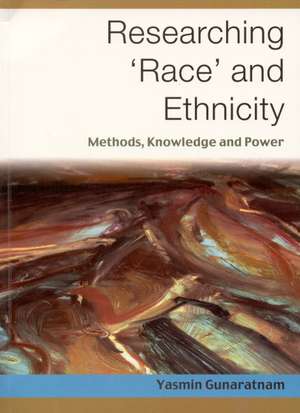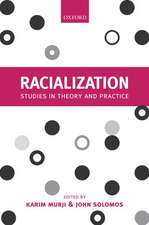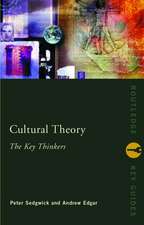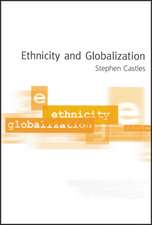Researching 'Race' and Ethnicity: Methods, Knowledge and Power
Autor Yasmin Gunaratnamen Limba Engleză Paperback – 17 aug 2003
'This is a welcome book for those engaged in policy and empirical work with an active research agenda… there is a level of theoretical sophistication in the text which is often missing from texts concerned with methods in this area' - Race Relations Abstracts
`The particular value of this book to readers lies in the discussion of "race", ethnicity and research issues within a political and social context. The author states her intention to explore some of the theoretical and practical dilemmas of researching "race" and ethnicity. This is, without question, achieved. I recommend it as essential reading for those concerned with increasing their awareness of issues relating to race, ethnicity and research practice' - Nurse Researcher
'This is a thought-provoking and challenging book which demonstrated the fractured and fluid nature of difference and power in the research process. Importantly it offers a guide to the ways in which research can be effectively and productively used in challenging the status quo' - Diversity in Health and Social Care
Researching `Race' and Ethnicity provides an innovative discussion of the methodological, epistemological and ethical challenges of doing qualitative research that is informed by questions of `race', ethnicity and social difference. By identifying and challenging `categorical thinking' and many longstanding assumptions about the meanings of `race' and ethnicity, the author gets to the heart of many of the everyday dilemmas and difficulties that researchers confront in the field, but are rarely theorised or openly discussed.
Yasmin Gunaratnam's insistence that `race' and ethnicity are a significant part of all qualitative research, and are not the `specialist' concerns of those whose work is explicitly focussed upon `race', provokes a radical rethinking of current methological debates. How do racial and ethnic categories inform our approaches to research? How does the racialised indentity of the researcher and the research participants affect the research interaction and the knowledge that we produce? What are the assumptions that are made about racialised subjectivity and inter-subjectivity? How can we make sense of accounts in which `race' and ethnicity are silent or are non-manifest? How can we work ethically across difference?
In examining these and other questions, the wide-ranging discussions in the book are animated by examples drawn from the author's ethnographic research with white and minoritized research participants. Through these examples readers will be able to engage with some of the complexities of research relationships, power relations and ethical concerns about engagement, disconnection and complicity in research. The attention that the book gives to the excluded experiences of minoritized researchers will be of particular value to many readers.
Researching `Race' and Ethnicity is essential reading for students and academics in the social sciences.
| Toate formatele și edițiile | Preț | Express |
|---|---|---|
| Paperback (1) | 521.08 lei 6-8 săpt. | |
| SAGE Publications – 17 aug 2003 | 521.08 lei 6-8 săpt. | |
| Hardback (1) | 1221.87 lei 6-8 săpt. | |
| SAGE Publications – 6 aug 2003 | 1221.87 lei 6-8 săpt. |
Preț: 521.08 lei
Preț vechi: 613.04 lei
-15% Nou
Puncte Express: 782
Preț estimativ în valută:
99.72€ • 103.73$ • 82.33£
99.72€ • 103.73$ • 82.33£
Carte tipărită la comandă
Livrare economică 14-28 aprilie
Preluare comenzi: 021 569.72.76
Specificații
ISBN-13: 9780761972877
ISBN-10: 0761972870
Pagini: 224
Dimensiuni: 170 x 242 x 13 mm
Greutate: 0.4 kg
Ediția:First Edition
Editura: SAGE Publications
Colecția Sage Publications Ltd
Locul publicării:London, United Kingdom
ISBN-10: 0761972870
Pagini: 224
Dimensiuni: 170 x 242 x 13 mm
Greutate: 0.4 kg
Ediția:First Edition
Editura: SAGE Publications
Colecția Sage Publications Ltd
Locul publicării:London, United Kingdom
Recenzii
'This is a welcome book for those engaged in policy and empirical work
with an active research agenda. There are three parts to the book, with the most persuasive being the second, which looks at the thorny questions of what the author describes as 'race of interviewer effects' in
other words does it matter what race or ethnicity the interviewer is in social research. Gunaratnam looks at this problem in terms of the social
construction of the nature of research on racialized groups in Britain. The
very fact that the race/ ethnicity of a researcher is posed as a problem for
reflection and questioning is the starting point for the author. In this way, the race/ethnicity of the researchers matters as a source of methodological concern, but there is no correct method for all contexts.
Indeed, there is a level of theoretical sophistication in the text which is
often missing from texts concerned with methods in this area. But this
does not take away from socially committed comment on the author's
fieldwork area of hospice provision. Here we find the application of some
of the methodological issues raised in the book in the author's own work.
The only criticism is the specificity of this research area for the general
ideas that are presented, a more general overview of research in the arena
(a difficult and wide ranging task) and how it may apply to the framework
presented would have been more useful. However, this is still one of the
few books, out of Britain, which takes seriously the issues of methodology and race' - Race Relations Abstacts
'This is a thought-provoking and challenging book which demonstrated the fractured and fluid nature of difference and power in the research process. Importantly it offers a guide to the ways in which research can be effectively and productively used in challenging the status quo' - Diversity in Health and Social Care
other words does it matter what race or ethnicity the interviewer is in social research. Gunaratnam looks at this problem in terms of the social
construction of the nature of research on racialized groups in Britain. The
very fact that the race/ ethnicity of a researcher is posed as a problem for
reflection and questioning is the starting point for the author. In this way, the race/ethnicity of the researchers matters as a source of methodological concern, but there is no correct method for all contexts.
Indeed, there is a level of theoretical sophistication in the text which is
often missing from texts concerned with methods in this area. But this
does not take away from socially committed comment on the author's
fieldwork area of hospice provision. Here we find the application of some
of the methodological issues raised in the book in the author's own work.
The only criticism is the specificity of this research area for the general
ideas that are presented, a more general overview of research in the arena
(a difficult and wide ranging task) and how it may apply to the framework
presented would have been more useful. However, this is still one of the
few books, out of Britain, which takes seriously the issues of methodology and race' - Race Relations Abstacts
'This is a thought-provoking and challenging book which demonstrated the fractured and fluid nature of difference and power in the research process. Importantly it offers a guide to the ways in which research can be effectively and productively used in challenging the status quo' - Diversity in Health and Social Care
Cuprins
PART ONE: INTRODUCTION - THINKING THROUGH KNOWLEDGE, METHODS AND POWER
Researching `Race' and Ethnicity
A `Treacherous Bind'
Working with and against Racial Categories
PART TWO: DEBATES AND DILEMMAS IN `INTERRACIAL' RESEARCH
Faking `Race' or `Making Race'?
`Race-of-Interviewer-Effects' in Survey Research
Messy Work
Qualitative Interviewing across Difference
PART THREE: THE DOINGS AND UNDOINGS OF `RACE' - RESEARCHING LIVED EXPERIENCE
Looking for `Race'?
Analyzing Racialized Meanings and Identifications
`What Do You Mean?' Insecurities of Meaning and Difference
Threatening Topics and Difference
Encounters in Psycho-Social Space
Towards Multi-Sited Research
Connection, Juxtapositioning and Complicity
Researching `Race' and Ethnicity
A `Treacherous Bind'
Working with and against Racial Categories
PART TWO: DEBATES AND DILEMMAS IN `INTERRACIAL' RESEARCH
Faking `Race' or `Making Race'?
`Race-of-Interviewer-Effects' in Survey Research
Messy Work
Qualitative Interviewing across Difference
PART THREE: THE DOINGS AND UNDOINGS OF `RACE' - RESEARCHING LIVED EXPERIENCE
Looking for `Race'?
Analyzing Racialized Meanings and Identifications
`What Do You Mean?' Insecurities of Meaning and Difference
Threatening Topics and Difference
Encounters in Psycho-Social Space
Towards Multi-Sited Research
Connection, Juxtapositioning and Complicity
Notă biografică
I joined the Department in 2008. Before that I was involved in research, teaching and training in Higher Education and in the voluntary sector. I have worked for the Open University, Southampton University and the University of Central Lancashire. My undergraduate degree in sociology is from the London School of Economics, where I also completed my PhD (Department of Social Policy). I am particularly interested in knowledge transfer and participative methodologies as they relate to both research and teaching (giving recognition to what we learn and how from students and colleagues).
Descriere
Researching 'Race' and Ethnicity provides an innovative discussion of the methodological, epistemological and ethical challenges of doing qualitative research that is informed by questions of 'race', ethnicity and social difference. The book will be essential reading for students and academics across the social sciences.














